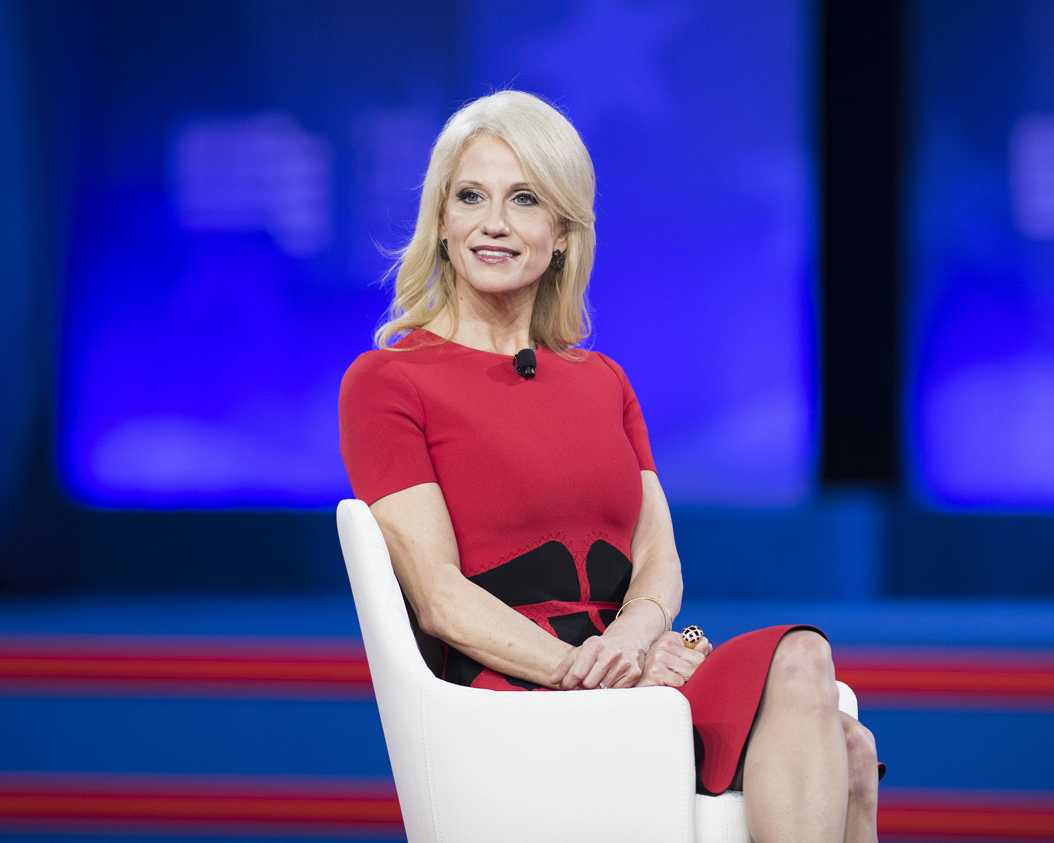Editorial: Trump, Conway misstate facts on feminism


Kellyanne Conway speaks at CPAC on Feb. 22., 2017. (Michael Brochstein/Sipa USA/TNS)
In an era of women’s marches, the #MeToo trend and fourth-wave feminism, it’s astonishing how frequently the movement for women’s rights is still widely misunderstood. And President Donald Trump took the opportunity this weekend to exemplify the intellectual disconnect.
After an interview Saturday with the president, media hanger-on Piers Morgan tweeted out a definitive declaration of Trump’s attitudes toward feminist thought. He hates it — or at least, he hates what he imagines it is.
“I wouldn’t say I’m a feminist. I mean, I think that would be, maybe, going too far,” Morgan quoted the president saying. “I’m for women, I’m for men, I’m for everyone.”
It’s difficult to imagine what kind of person would find the statement from Trump — who’s bragged about sexual assault and treated women in his beauty pageants like objects — surprising. But even putting aside his checkered history on women’s issues, it’s clear the president’s position of power distorts his perception of gender politics.
For Trump and other men in positions of largely unearned status, it’s no coincidence feminism comes to stand for something primarily focused on tearing down men. The word, whose dictionary definition explicitly qualifies advocacy for women’s rights in the name of “social equality of the sexes,” doesn’t seem to carry that connotation into the American public.
According to an April 2013 YouGov poll, 82 percent of Americans said they supported “gender equality” — yet only 20 percent considered themselves either a “strong feminist” or a “feminist.” And that huge disparity doesn’t appear to have occurred by accident — conservative pundits from Rush Limbaugh to Tomi Lahren have consistently trashed members of the movement as unattractive women looking to be made into victims.
Probably the best — or worst — example of this seemingly intentional misrepresentation of feminist values and goals comes from Kellyanne Conway — a member of the Trump White House and the first woman to run a successful presidential campaign. In a speech at the Conservative Political Action Conference last February, Conway explained she didn’t consider herself a “classic feminist” because it was too “anti-male” and not “individual” enough.
“There’s an individual feminism, if you will, that you make your own choices,” Conway said. “I look at myself as a product of my choices, not a victim of my circumstances.”
Conway — and apparently Trump — view gender politics as a zero-sum game. Either men have rights and power, or women do. It’s difficult to see how the demands made by mainstream feminists, whether it’s freedom from sexual harassment, access to women’s health care or equal pay for equal work, would hurt men. And while women like Conway have been fortunate enough to meet with success because of personal effort, anecdotes of success don’t equate to a negation of systemic disadvantages women face.
While it’s hardly a new development, we shouldn’t ignore the absurdity of someone like Trump claiming to be simultaneously in favor of women’s equality and opposed to the feminist movement. A worldview in which every gain for women comes at men’s expense simply misstates reality — and distracts from the real struggle for women’s rights.
Recent Posts
Porch roof collapse injures dozens during party on Semple Street
The roof of a porch on Semple Street collapsed during a St. Patrick’s Day celebration…
A Good Hill to Die On // Break It Down
In this release of “A Good Hill to Die On,” I dive deep into the…
Who Asked? // Does growth only “count” if it’s quantifiable?
This installment of Who Asked? by staff writer Brynn Murawski wonders why it feels like…
“They’re throwing trans people under the bus”: Counseling center faces backlash after event name change
On Feb. 24, Pitt’s Counseling Center faced backlash after briefly renaming an event from "LGBT…
Q&A: Meet the 2024-2025 SGB president and vice president
SGB announced the 2024-2025 election results at their meeting on Tuesday. The Pitt News spoke…
Editorial | Pitt Administration must listen to its students’ electoral demands
The passing of these referendums does not guarantee a future Pitt with these policies. Merely,…

